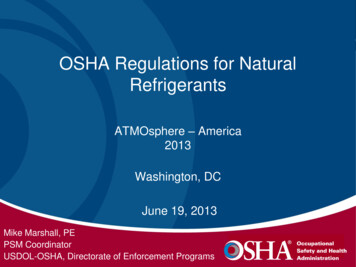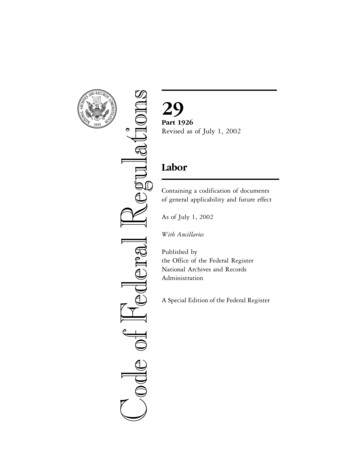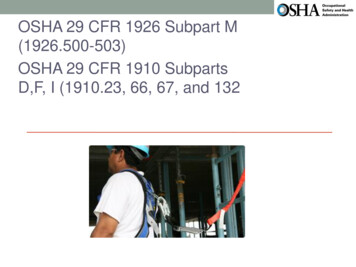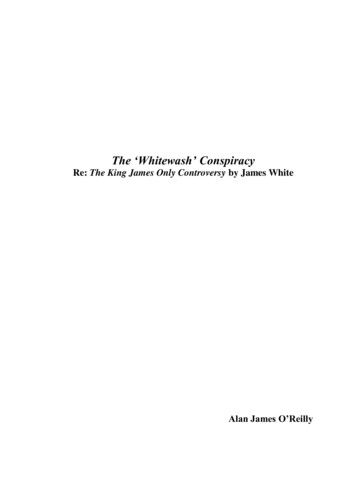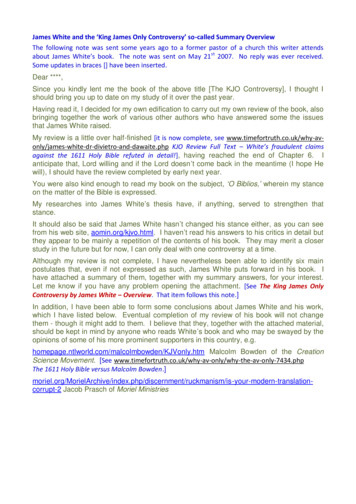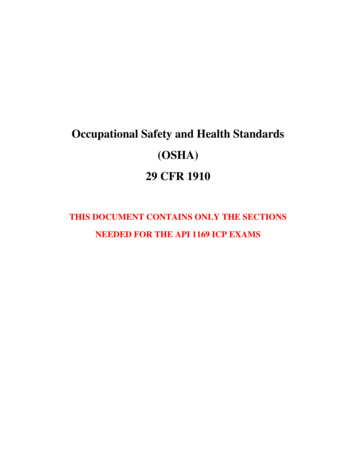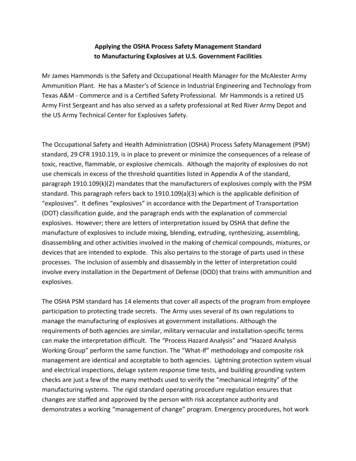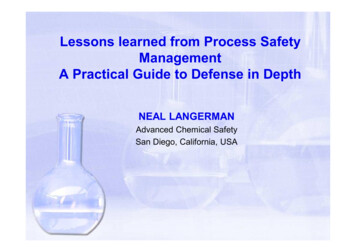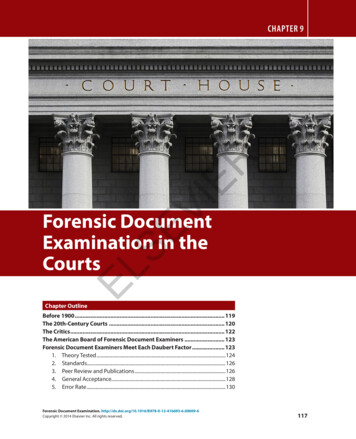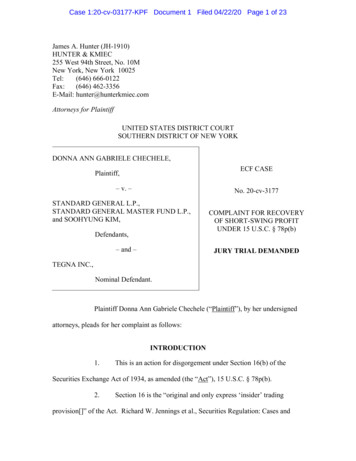
Transcription
Case 1:20-cv-03177-KPF Document 1 Filed 04/22/20 Page 1 of 23James A. Hunter (JH-1910)HUNTER & KMIEC255 West 94th Street, No. 10MNew York, New York 10025Tel:(646) 666-0122Fax:(646) 462-3356E-Mail: hunter@hunterkmiec.comAttorneys for PlaintiffUNITED STATES DISTRICT COURTSOUTHERN DISTRICT OF NEW YORKDONNA ANN GABRIELE CHECHELE,ECF CASEPlaintiff,– v. –No. 20-cv-3177STANDARD GENERAL L.P.,STANDARD GENERAL MASTER FUND L.P.,and SOOHYUNG KIM,Defendants,– and –COMPLAINT FOR RECOVERYOF SHORT-SWING PROFITUNDER 15 U.S.C. § 78p(b)JURY TRIAL DEMANDEDTEGNA INC.,Nominal Defendant.Plaintiff Donna Ann Gabriele Chechele (“Plaintiff”), by her undersignedattorneys, pleads for her complaint as follows:INTRODUCTION1.This is an action for disgorgement under Section 16(b) of theSecurities Exchange Act of 1934, as amended (the “Act”), 15 U.S.C. § 78p(b).2.Section 16 is the “original and only express ‘insider’ tradingprovision[]” of the Act. Richard W. Jennings et al., Securities Regulation: Cases and
Case 1:20-cv-03177-KPF Document 1 Filed 04/22/20 Page 2 of 23Materials 1202 (8th ed. 1998). It works to “prevent[] the unfair use of information thatmay have been obtained by [an insider] by reason of his relationship to the issuer.” Id.§ 78p(a).3.The statute applies to the directors and officers of every issuer of aclass of publicly traded equity securities. Id. § 78p(a), (b). It also applies to everybeneficial owner of more than 10% of any such class. Id. Under Section 16(b), these“insiders” must disgorge to the issuer any profit they realize from a purchase and sale, ora sale and purchase, of the issuer’s equity securities occurring within a period of less thansix months. Id. § 78p(b). If an insider fails to disgorge this “short-swing” profit, thestatute empowers the issuer, or “the owner of any security of the issuer,” to bring suit torecover it. Id.4.Liability under Section 16(b) is strict. The profit from a short-swing transaction must be disgorged “irrespective of any intention on the part of [theinsider] in entering into such transaction.” Id. Recovery never depends on proof ofscienter, a breach of duty, or the actual misuse of inside information. See Reliance Elec.Co. v. Emerson Elec. Co., 404 U.S. 418, 422 (1972).5.Plaintiff, a stockholder of Nominal Defendant TEGNA Inc.(“TEGNA”), brings this suit against three affiliated activist investors: the hedge fundStandard General Master Fund L.P., its affiliated adviser Standard General L.P., and theirprincipal Soohyung Kim. Plaintiff refers to this group collectively as the “StandardGeneral Defendants”, or simply “Standard General”.6.In its efforts to shake up TEGNA’s board, Standard Generalexecuted a series of transactions in the company’s common stock and derivative-2-
Case 1:20-cv-03177-KPF Document 1 Filed 04/22/20 Page 3 of 23securities that unwittingly carried it over the 10% threshold, exposing it to Section 16 ofthe Act. Standard General then realized millions of dollars in short-swing profit from itspurchase and sale of TEGNA’s equity securities. Under Section 16(b), this profit is nowTEGNA’s lawful property, which Standard General is strictly liable to account for andrepay.JURISDICTION AND VENUE7.Jurisdiction is conferred on this Court by Section 27 of the Act, 15U.S.C. § 78aa, and by 28 U.S.C. § 1331.8.Venue lies in this District under Section 27 of the Act and 28U.S.C. § 1401 (a) because Standard General is found in and transacts significant businessin this District, maintaining its principal office on Fifth Avenue in midtown Manhattan;and (b) because certain of the transactions giving rise to the liability described hereinwere executed through the facilities of the New York Stock Exchange LLC, a nationalsecurities exchange registered under Section 6 of the Act, 15 U.S.C. § 78f, and located inthis District.THE PARTIESThe Parties to This Action9.Plaintiff Donna Ann Gabriele Chechele is a natural person, aresident of the State of New Jersey, and a stockholder of TEGNA.10.Defendant Standard General Master Fund L.P. (the “StandardGeneral Fund”) is a limited partnership formed under the law of the Cayman Islands,with a principal place of business located at 767 Fifth Avenue, 12th Floor, New York,New York 10153.-3-
Case 1:20-cv-03177-KPF Document 1 Filed 04/22/20 Page 4 of 2311.Defendant Standard General L.P. (the “Standard General Adviser”)is a limited partnership formed under the law of the State of Delaware, with a principalplace of business located at 767 Fifth Avenue, 12th Floor, New York, New York 10153.The Standard General Adviser serves as the investment manager of the Standard GeneralFund. In that capacity, the Standard General Adviser manages the portfolio of theStandard General Fund and coordinates purchases and sales of securities among theStandard General Fund and the Standard General Adviser’s other clients.12.Defendant Soohyung Kim (“Kim”) is a natural person and aresident of the City of New York. Kim serves as the Standard General Adviser’s chiefexecutive officer and chief investment officer and is the ultimate decisionmaker for theStandard General Fund.13.Nominal Defendant TEGNA Inc., which Plaintiff refers to as“TEGNA,” is a corporation formed under the law of the State of Delaware with aprincipal place of business located at 8350 Broad Street, Tysons, Virginia 22102. Thisaction is brought in the right and for the benefit of TEGNA, which is named as a nominaldefendant solely to ensure that all necessary parties are before the Court.FACTSStandard General’s Investment in TEGNA14.TEGNA is a publicly held media company with 62 televisionstations and four radio stations in 51 U.S. markets. It was known as Gannett Co., Inc.until 2015, when it spun off its legacy publishing business and adopted its current name.15.Standard General is a hedge fund group with a portfolio heavilyweighted toward media companies. It has been a TEGNA investor since at least June-4-
Case 1:20-cv-03177-KPF Document 1 Filed 04/22/20 Page 5 of 232019, when it beneficially owned 6,237,143 shares of TEGNA’s common stock, or about4.10% of shares outstanding.16.In August and September 2019, Standard General dramaticallyincreased its TEGNA stake, scooping up nearly 15 million additional shares.17.By the start of the new year, Standard General had its eye onTEGNA’s board. It announced in a January 15, 2020 press release that it planned tomount a proxy contest to oust four members of the board and replace them with its ownnominees.18.The contest was launched on March 30, 2020 with the filing of adefinitive proxy statement with the SEC. The statement disclosed that the StandardGeneral Fund, in its capacity as the record owner of 100 shares of TEGNA’s commonstock, had nominated four candidates for election to TEGNA’s board.19.Although the Standard General Fund stood in as the de jurenominator, Kim and the Standard General Adviser have run the campaign in tandem withthe fund. The proxy statement was officially filed by all three Standard GeneralDefendants. It named Kim as a nominee and disclosed that all three parties are jointlysoliciting proxies in his favor and in favor of the other nominees.20.When Standard General first announced its intentions back inJanuary, it beneficially owned 21,124,315 shares of TEGNA’s common stock, or about9.74% of shares outstanding.21.Not all of this stake took the form of physical shares. A portion ofit was “synthetic,” acquired through a type of derivative security known as an equityswap.-5-
Case 1:20-cv-03177-KPF Document 1 Filed 04/22/20 Page 6 of 2322.Because Standard General’s swaps played a significant role in theevents that followed, some discussion of their mechanics is necessary.The Equity Swaps23.An equity swap is a contract between two parties to exchange, or“swap,” the returns on two baskets of assets over a specified term.24.In a typical equity swap, one of the baskets contains stock whilethe other contains an interest-rate product, such as a government bond. For the durationof the swap’s term, the party with the equity “leg” is entitled to receive payments equal tothe positive return (price appreciation plus dividends) on the reference stock.25.In exchange, the equity party agrees to make payments to thecounterparty equal to any negative return on the reference stock. The equity party mustalso pay the counterparty regular installments of interest on the fixed-income basket.26.Typically, no money changes hands at contract inception. Instead,the counterparties agree on a starting value, or “notional amount,” that is deemed to beinvested in each of the two baskets for the term of the contract. The returns on the twobaskets are then compared at regular intervals, with the outperforming party entitled to asingle net payment from the other equal to the difference between the two returns. Afinal net payment is made at the expiration of the swap.27.The equity basket in Standard General’s swaps contained TEGNAcommon stock. In exchange for making regular interest payments to its counterparty,Standard General enjoyed the risks and rewards of owning TEGNA’s common stock. Ifthe stock outperformed the reference interest-rate product, then the counterparty had topay Standard General the difference. If the stock lagged the interest rate, then StandardGeneral had to pay the difference to the counterparty.-6-
Case 1:20-cv-03177-KPF Document 1 Filed 04/22/20 Page 7 of 2328.Equity swaps can be used as a form of leverage. They allow asophisticated party like Standard General to enjoy outsized exposure to a company’sstock without actually shelling out to buy the shares.29.As of January 15, 2020, for example, Standard General had title tojust 19,108,953 of the 21,124,315 TEGNA shares it reported beneficially owning. Theremaining 2,015,362 shares underlay equity swaps.30.In effect, Standard General enjoyed the risks and rewards ofowning 21,124,315 TEGNA shares even though it had paid for only 19,108,953 of them.31.For the activist investor, however, swaps do have a drawback.Because a swap supplies a contractual simulacrum of stock ownership rather than the realMcCoy, the investor cannot actually vote the reference shares. This can be a problem foran activist who needs a lot of stock voted his way to win a proxy contest.32.Happily for Standard General, its swaps had a physical settlementoption. The option gave Standard General the right at any time during the term of theswap to settle the contract by paying off the interest and principal on the fixed-income legand receiving in return the stock underlying the equity leg.33.Standard General relied on the physical settlement option to juiceits voting power at TEGNA’s annual meeting, but the same contract term helped saddle itwith a substantial Section 16(b) liability.The Pre-Meeting Transactions34.The 2020 annual meeting of TEGNA’s stockholders is scheduledto be held on April 30, 2020 at 8:00 a.m. in Tysons, Virginia.35.TEGNA’s board has fixed March 20, 2020 as the record date forthe annual meeting.-7-
Case 1:20-cv-03177-KPF Document 1 Filed 04/22/20 Page 8 of 2336.All TEGNA stockholders of record at the close of business onMarch 20, 2020 will be entitled to cast one vote for each share then held of record oneach proposal properly presented at the meeting, including the election of TEGNA’sdirectors.37.On March 16, 2020, in anticipation of the coming record date,Standard General exercised its contractual right to settle its swaps early and receivedelivery of the underlying TEGNA stock.38.As a result of the early settlement, Standard General took deliveryof 2,015,362 shares of TEGNA’s common stock on or about March 18, 2020, just twodays before the record date for the annual meeting.39.Standard General held those 2,015,362 shares through the close ofbusiness on March 20, 2020.40.Added to the 19,108,953 shares Standard General already held,those 2,015,362 new shares made Standard General the record owner of 21,124,315shares of TEGNA’s common stock at the close of business on March 20, 2020.41.As a result, Standard General will now be entitled to vote all21,124,315 shares of TEGNA’s common stock, or about 9.70% of shares outstanding, atthe annual meeting to be held on April 30, 2020.42.Standard General’s interest in the franchise proved short-lived.Less than a week after the record date, it began dumping millions of shares of TEGNA’scommon stock, including all the stock it had acquired by settling its swaps just daysearlier.-8-
Case 1:20-cv-03177-KPF Document 1 Filed 04/22/20 Page 9 of 2343.On March 25, 2020, Standard General sold 1,000,000 shares ofTEGNA’s common stock at a price of 12.5852 per share.44.On the same day, Standard General executed a new equity swapagreement referencing 1,000,000 shares of TEGNA’s common stock at an initialreference price of 12.60 per share.45.Standard General continued unwinding its physical stock positionover the next several days, ultimately selling a total of 5,000,000 shares of TEGNA’scommon stock. In separate transactions around the same time, it also signed up newswap agreements covering an identical number of shares. The following paragraphsdetail these maneuvers.46.On March 26, 2020, Standard General:(a)sold 1,000,000 shares of TEGNA’s common stock at theprice of 13.268 per share; and(b)entered into an equity swap referencing 1,000,000 shares ofTEGNA’s common stock at an initial reference price of 13.2783 per share.47.On March 27, 2020, Standard General:(a)sold 1,000,000 shares of TEGNA’s common stock at theprice of 12.9839 per share; and(b)entered into an equity swap referencing 1,000,000 shares ofTEGNA’s common stock at an initial reference price of 12.9914 per share.48.On March 30, 2020, Standard General:(a)sold 1,000,000 shares of TEGNA’s common stock at theprice of 10.5788 per share; and-9-
Case 1:20-cv-03177-KPF Document 1 Filed 04/22/20 Page 10 of 23(b)entered into an equity swap referencing 1,000,000 shares ofTEGNA’s common stock at an initial reference price of 10.5883 per share.49.On March 31, 2020, Standard General:(a)sold 1,000,000 shares of TEGNA’s common stock at theprice of 10.8205 per share; and(b)entered into an equity swap referencing 1,000,000 shares ofTEGNA’s common stock at an initial reference price of 10.8248 per share.50.Although Standard General entered into each new swap fast on theheels of a stock sale, the two transactions were executed separately and independently ofone another, and at slightly different times.51.That the stock and swap transactions were not coupled together isevident from the price difference between them. To take just one example, StandardGeneral locked in a purchase price of 13.2783 on the swap it signed up on March 26,2020, while the stock sale it executed that same day went off at a slightly lower price of 13.268 per share.52.Standard General’s quick pivot on the stock did not escape thenotice of TEGNA’s board. On April 1, 2020, the same day Standard General disclosedthe transactions described in paragraphs 42-49 above, TEGNA put out a press releasepointing its investors to the 5,000,000 jettisoned shares. The press release read inpertinent part:Today’s Schedule 13-D amendment filing by Standard Generalshould be troubling for all TEGNA shareholders. Just one dayafter describing itself in a letter to shareholders as ‘the largestactive shareholder of TEGNA’ with a 9.7% ownership position,Standard General today disclosed that it sold approximately 25%of its shares shortly after the record date and instead took-10-
Case 1:20-cv-03177-KPF Document 1 Filed 04/22/20 Page 11 of 23derivative positions. This reduced its stock ownership positionwhile likely retaining its ability to vote all of the shares it heldprior to those recent sales at TEGNA’s upcoming annual meeting.None of this information was communicated in yesterday’s letter,and we urge shareholders to look at the Schedule 13-D amendmentfor themselves.53.Wincing in the spotlight, Standard General made its second about-face in as many weeks. The day after the press release hit, Standard General made adisplay of buying back most of the 5,000,000 shares it had sold just days earlier.54.The repurchase was accomplished in a single block trade onApril 2, 2020, when Standard General bought 4,591,164 shares of TEGNA’s commonstock at a price of 11.075 per share.55.Table 1 summarizes Standard General’s transactions in TEGNA’scommon stock in March and April 2020:DateType of TransactionNumber of SharesPrice per Share03/18/20Acquisition of stock uponsettlement of swap2,015,362N/A03/25/20Sale of stock(1,000,000) 12.585203/25/20Entry into swap1,000,000 12.600003/26/20Sale of stock(1,000,000) 13.268003/26/20Entry into swap1,000,000 13.278303/27/20Sale of stock(1,000,000) 12.983903/27/20Entry into swap1,000,000 12.991403/30/20Sale of stock(1,000,000) 10.578803/30/20Entry into swap1,000,000 10.5883-11-
Case 1:20-cv-03177-KPF Document 1 Filed 04/22/20 Page 12 of 2303/31/20Sale of stock(1,000,000) 10.820503/31/20Entry into swap1,000,000 10.824804/02/20Purchase of stock4,591,164 11.0750Table 1. Standard General’s transactions in TEGNA’s common stock and derivative securities in Marchand April 2020. Each swap can be physically settled at any time at Standard General’s option.Transactions in italics are subject to Section 16(b).56.As will be seen, all of Standard General’s transactions afterMarch 25, 2020 (i.e., the ones in italics in Table 1 above) were subject to Section 16(b).The Section 16(b) Liability57.For purposes of Section 13(d) of the Act, a person beneficiallyowns stock if he has or shares, directly or indirectly, (a) the power to vote the stock or(b) the power to dispose of the stock. See Rule 13d-3(a), 17 C.F.R. § 240.13d-3(a).58.In addition, a person is deemed to beneficially own stock if, whilelacking the instant power to vote or dispose of the stock, he has the right to acquire thatpower within 60 days. See id. § 240.13d-3(d)(1)(i) (“A person shall be deemed to be thebeneficial owner of a security . . . if that person has the right to acquire beneficialownership of such security, as defined in Rule 13d-3(a) (§ 240.13d-3(a)) within sixtydays . . . .”).59.Section 16 relies on the same beneficial ownership rules forpurposes of determining those persons subject to the statute as the beneficial owners ofmore than 10% of a class of registered equity securities. See Rule 16a-1(a)(1), 17 C.F.R.§ 240.16a-1(a)(1) (“Solely for purposes of determining whether a person is a beneficialowner of more than ten percent of any class of equity securities registered pursuant to-12-
Case 1:20-cv-03177-KPF Document 1 Filed 04/22/20 Page 13 of 23section 12 of the Act, the term ‘beneficial owner’ shall mean any person who is deemed abeneficial owner pursuant to section 13(d) of the Act and the rules thereunder . . . .”).60.Under these rules, Standard General beneficially owned theTEGNA stock in its portfolio because it had the power to vote and sell the stock.61.But Standard General also beneficially owned the TEGNA stockunderlying its equity swaps, because the swaps had physical settlement options thatallowed Standard General, at any time, to take delivery of the underlying shares andthereby acquire voting and dispositive power over them.62.The swaps’ physical settlement terms are known because StandardGeneral disclosed them on statements filed with the SEC on Schedule 13D onSeptember 30, 2019, January 15, 2020, and March 18, 2020, and on a statement filedwith the SEC on Form 3 on April 7, 2020.63.In the case of the swaps held prior to March 16, 2020, the physicalsettlement option is also known because Standard General actually exercised the optionby taking delivery of the underlying shares on March 18, 2020 as described earlier.64.Standard General has taken the view that its transactions betweenMarch 25 and March 31, 2020 — selling 5,000,000 shares of TEGNA’s common stockand signing up swaps on a like number of shares — had no net effect on its beneficialownership.65.In a statement filed with the SEC on Schedule 13D on April 1,2020, for example, Standard General reported no change in the number of sharesbeneficially owned from the last statement filed on March 18, 2020.-13-
Case 1:20-cv-03177-KPF Document 1 Filed 04/22/20 Page 14 of 2366.Standard General’s view is incorrect, and the beneficial ownershipnumbers disclosed in its statements filed with the SEC after March 18, 2020 arematerially false.67.Standard General’s view is incorrect, and its disclosure false,because the sales between March 25, 2020 and March 31, 2020 did not divest it ofbeneficial ownership of the 5,000,000 shares sold.68.Standard General still beneficially owns the 5,000,000 shares itsold between March 25, 2020 and March 31, 2020 because it retains the power to votethem at TEGNA’s annual meeting, having held them through the record date ofMarch 20, 2020.69.Standard General’s vestigial power to vote the 5,000,000 sharessold between March 25, 2020 and March 31, 2020 will not be extinguished until theconclusion of TEGNA’s annual meeting on April 30, 2020. See, e,g., Exchange ActSections 13(d) and 13(g) and Regulation 13D-G Beneficial Ownership ReportingCompliance & Disclosure Interpretation No. 104.07 (Sept. 24, 2009) (“[V]oting power isnot extinguished until the conclusion of the meeting . . . .”), available eg13d-interp.htm.70.Until then, Standard General must include those 5,000,000 sharesin every calculation of its beneficial ownership. See id. (“The security holder should notfile the final amendment on Schedule 13D until the end of the shareholder meeting.”); seealso Peter J. Romeo & Alan L. Dye, Section 16 Treatise and Reporting Guide 146 n.170(4th ed. 2012) (“If the sale [i.e., a sale after the record date] brings the seller’s ownership-14-
Case 1:20-cv-03177-KPF Document 1 Filed 04/22/20 Page 15 of 23below 10 percent of the class, the seller will remain a ten percent owner through thestockholder meeting.”).71.But even though Standard General’s sales between March 25, 2020and March 31, 2020 had no effect on its beneficial ownership, the new swaps it acquiredduring that time did. Each swap boosted its beneficial ownership by 1,000,000 sharesbecause the swap could be physically settled at Standard General’s option, giving it theimmediate right to acquire voting or dispositive power over the underlying stock.72.Standard General’s transactions between March 25, 2020 andMarch 31, 2020 thus had a ratchet effect on its beneficial ownership. The stock salesmade no difference in the number of shares it beneficially owned, while every new swapaccounted for beneficial ownership of 1,000,000 additional shares.73.It follows that Standard General’s transactions on March 25, 2020left it with beneficial ownership of a total of 22,124,315 shares of TEGNA’s commonstock. That number includes both the 21,124,315 shares Standard General held on theMarch 20 record date (and therefore had the lingering power to vote) plus the1,000,000 new shares it had the right to acquire under the March 25 swap.74.As of March 20, 2020, TEGNA had 218,352,668 shares ofcommon stock outstanding, and that number has not changed materially since then.75.It now takes but simple arithmetic to show that, at the close ofMarch 25, 2020, Standard General was a beneficial owner of 22,124,315 218,352,668 10.13% of TEGNA’s outstanding common stock.76.Standard General has remained a beneficial owner of more than10% of TEGNA’s common stock at all times since March 25, 2020 and, as such, has-15-
Case 1:20-cv-03177-KPF Document 1 Filed 04/22/20 Page 16 of 23been subject to Section 16(b) of the Act with respect to its transactions in TEGNA’sequity securities. See Romeo & Dye, supra, 146 n.170 (“[T]he insider . . . will berequired to report on Form 4 (and will be subject to potential Section 16(b) liability for)any additional trades that occur prior to the meeting of stockholders.”).77.Those transactions include its sales of TEGNA common stockbetween March 26, 2020 and March 31, 2020, as well as its backtrack repurchase of thestock on April 2, 2020.78.But Section 16(b) also reaches the new swap agreements StandardGeneral signed up between March 26, 2020 and March 31, 2020.79.Those swaps are “derivative securities” for purposes of Section 16.See Rule 16a-1(c), 17 C.F.R. § 240.16a-1(c). They give Standard General a “callequivalent position” in TEGNA’s common stock because their value tends to increasewith the stock price. See id. § 240.16a-1(b).80.Each time Standard General established a call equivalent positionby executing a new swap, it was deemed to have purchased the underlying stock forpurposes of Section 16(b). See Rule 16b-6(a), 17 C.F.R. § 240.16b-6(a) (“Theestablishment of or increase in a call equivalent position . . . shall be deemed a purchaseof the underlying security for purposes of section 16(b) of the Act . . . .”).81.The deemed purchase price was supplied by the contemporaneousmarket price of TEGNA’s common stock, which also served as the initial reference pricefor each swap. See id. § 240.16b-6(c)(2).-16-
Case 1:20-cv-03177-KPF Document 1 Filed 04/22/20 Page 17 of 2382.In other words, each swap signed up between March 26, 2020 andMarch 31, 2020 was treated as a stock purchase, “matchable” under Section 16(b) at itsinitial reference price with Standard General’s stock sales during the same period.83.The stock sales are also matchable under Section 16(b) withStandard General’s stock purchase on April 2, 2020.84.Table 2 summarizes the Section 16(b) treatment of the transactionsfor which Standard General must bear liability:DateSection 16(b) TransactionNumber of SharesPrice per Share03/26/20Sale(1,000,000) 13.268003/26/20Purchase1,000,000 13.278303/27/20Sale(1,000,000) 12.983903/27/20Purchase1,000,000 12.991403/30/20Sale(1,000,000) 10.578803/30/20Purchase1,000,000 10.588303/31/20Sale(1,000,000) 10.820503/31/20Purchase1,000,000 10.824804/02/20Purchase4,591,164 11.0750Table 2. Section 16(b) treatment of Standard General’s transactionsin TEGNA’s common stock and equity swaps.Standard General’s Pecuniary Interest85.Standard General’s advisory clients, including the StandardGeneral Fund, have agreed to coordinate trading for their accounts through the StandardGeneral Adviser and, in his capacity as the adviser’s chief investment officer, Kim.-17-
Case 1:20-cv-03177-KPF Document 1 Filed 04/22/20 Page 18 of 2386.The Standard General Adviser executes all transactions for itsclients in gross according to Kim’s instructions.87.The Standard General Adviser then allocates securities purchasedand sold among the Standard General Fund and its other clients according to agreedallocation formulas and strategies.88.Although Standard General does not voluntarily disclose theseallocations, it is required in some cases to make limited disclosure. That disclosuresuggests that the Standard General Fund has a significant pecuniary interest in StandardGeneral’s transactions between March 26, 2020 and April 2, 2020.89.The definitive proxy statement Standard General filed with theSEC on March 30, 2020 discloses partial allocations for Standard General’s transactionson March 25, 26, and 27, 2020.90.According to that disclosure, 291,490 of the 1,000,000 shares ofTEGNA’s common stock sold on each of those days were allocated to the account of theStandard General Fund.91.The same filing discloses that 291,490 of the 1,000,000 sharesunderlying the swaps acquired on each of those days were allocated to the account of theStandard General Fund.92.Based on those numbers alone, the Standard General Fund realizeda short-swing profit of more than 80,000.93.If the same proportional allocations hold for the transactionsexecuted on March 30 and 31, 2020, then the Standard General Fund realized a shortswing profit of more than 781,000.-18-
Case 1:20-cv-03177-KPF Document 1 Filed 04/22/20 Page 19 of 2394.But Kim and the Standard General Adviser must also have somepecuniary interest in the transactions executed between March 26, 2020 and April 2,2020. It is de rigueur in the hedge fund industry for an adviser and its principals toreceive a “carry” or other performance compensation equal to a percentage of anypositive return realized on their clients’ investments. The extent of this performancecompensation depends on the fund and adviser but has historically been on the order of20% of the fund’s positive return.95.Kim and the Standard General Adviser are also likely to ownlimited partnership interests in the adviser’s fund clients, including the Standard GeneralFund. Some limited partnership stake is likely because fund investors have historicallyinsisted that a fund’s managers and principals maintain “skin in the game” by investingalongside them. Because the purpose of this arrangement is to align the interests of thefund’s investors and managers, it would be implausible for Kim and the Standard GeneralAdviser to have no interest in the investments they manage.96.There may be other Standard General funds that have realized ashort-swing profit through the transactions executed by Kim and the Standard GeneralAdviser between March 26, 2020 and April 2, 2020. Discovery will be required toidentify these funds, and this complaint may be amended to name additional funds asdefendants.97.Assuming that each Standard General fund had the sameproportional interest in all of the transactions executed between March 26, 2020 andApril 2, 2020, then TEGNA would be entitled to recover a total of 4,840,000.00 fromthe transactions alleged herein.-19-
Case 1:20-cv-03177-KPF Document 1 Filed 04/22/20 Page 20 of 23Plaintiff’s Demand98.By her counsel’s letter of April 2, 2020, Plaintiff made demand onTEGNA for recovery of the short-swing profit realized by Standard General from itstransactions in TEGNA’s common stock and derivative securities.99.TEGNA declined the demand by letter of April 14, 2020.TEGNA’s response
10. Defendant Standard General Master Fund L.P. (the “Standard General Fund”) is a limited partnership formed under the law of the Cayman Islands, with a principal place of business located at 767 Fifth Avenue, 12th Floor, New York, New York 10153. Case
